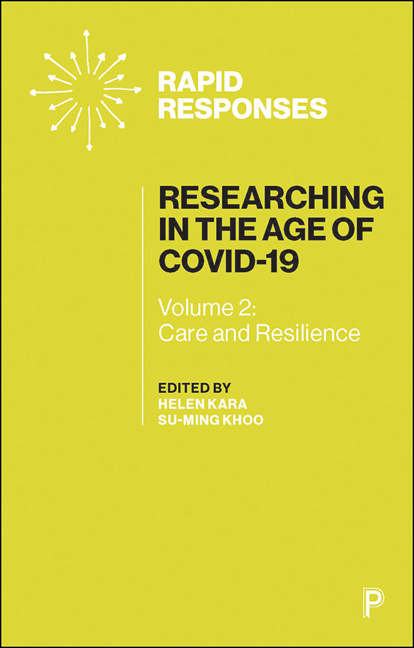Conclusion
Published online by Cambridge University Press: 23 March 2021
Summary
Care and resilience of participants, researchers and others, are rarely discussed in research methods books. This points to perhaps one of the small silver linings of the COVID-19 pandemic: in some research arenas, people have begun to take more care of each other. A global crisis that affects everyone, no matter where they live or however privileged or marginalized they may be, overturns outdated paternalistic Euro-Western ideas that researchers must protect vulnerable participants. In a global pandemic, anyone may be vulnerable – researcher and participant alike – and this shifts the power balance in research relationships.
The notion of an ‘ethics of care’ (Sevenhuijsen, 1998) appears here and there in the research literature, often as a counterpoint to an ‘ethics of justice’. However, the emphasis in the literature is often on care for research participants, with care for researchers – and other stakeholders such as gatekeepers – being side-lined or ignored. Researchers’ wellbeing is another topic which is rarely discussed in the research methods literature (Boynton, 2017; Velardo and Elliott, 2018); the term ‘researcher wellbeing’ yielded fewer than 100 hits on Google Scholar in mid-August 2020. We are pleased that this volume contributes useful material on these under-represented subjects.
We began with a rousing chapter from Petra Boynton who champions researcher wellbeing. Then Stephanie Snow outlines a national health research project using personal oral testimony, which shows how widespread vulnerability affects research in practice. From the three volumes in this series, this is the only section where both or all contributors come from the same country: the UK. Emma Partlow is another UK researcher whose chapter, in Part III, also addresses researcher wellbeing. An exploration of the literature indexed by Google Scholar on this topic suggests that the UK is indeed at the forefront of work on researcher wellbeing, though we are also aware of some excellent work on this topic from Australia, and no doubt other work is going on elsewhere. We hope these chapters will encourage researchers in more countries to recognize the importance of researcher wellbeing.
It is undeniable that some participants are more vulnerable than others, though we would argue that all participants have some level of agency and should be enabled to make their own decisions as far as possible.
- Type
- Chapter
- Information
- Researching in the Age of COVID-19Volume II: Care and Resilience, pp. 131 - 135Publisher: Bristol University PressPrint publication year: 2020



